|
|
|
Sort Order |
|
|
|
Items / Page
|
|
|
|
|
|
|
| Srl | Item |
| 1 |
ID:
100190
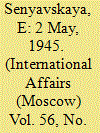

|
|
|
|
|
| Publication |
2010.
|
| Summary/Abstract |
THE PSYCHOLOGY OF THE WINNER in the Great Patriotic War is a unique phenomenon. It is the psychology of those people who lived through its initial period with its crushing defeats and retreats and the no less difficult subsequent stages with their unprecedented large-scale battles, when it was still not totally clear who would be the winner. But now there was no longer any doubt: our Victory was close at hand. And the feeling of being a winner, on the eve, during, and immediately after the Victory, indeed created a special psychological state in the people who had endured all the trials and tribulations and destroyed a strong, ruthless and lethal enemy.
It stands to reason that the entire war was a test of the spiritual and moral fiber of the Soviet soldier in conditions of constant risk, in situations that required immense exertion of every human strength, and often also self-sacrifice. Each period of the Great Patriotic War, with its particular moral and psychological dominant, determined the changes in the spiritual makeup of the frontline soldiers and in an individual's attitude to different areas of reality and life's values. But the feeling that Victory was near was particularly inherent in the final stage of the war, which in itself aroused an entire set of thoughts and feelings and a complex psychological state.
|
|
|
|
|
|
|
|
|
|
|
|
|
|
|
|
| 2 |
ID:
100172


|
|
|
|
|
| Publication |
2010.
|
| Summary/Abstract |
THE YEAR 2010 marks 50 years since the decisive events related to the liberation of Africa from colonial dependence. In November 1960, on the USSR's initiative, the 15th Session of the UN General Assembly adopted an important document, The Declaration on the Granting of Independence to Colonial Countries and Peoples, which proclaimed an end to the era of colonialism and the related practice of political dictate, segregation and racial discrimination. Amidst the drastic changes in the balance of forces on the international arena after World War II, a historical phenomenon took place, unprecedented in scope and scale. Within a very short period dozens of new states appeared on the African continent that started to build their own future independently. The bright names of national heroes of Africa entered the annals of world history. African names, unusual to the Russian ear, began to circulate in our country as well. One of the best remembered names was Patrice Lumumba, which was subsequently given to the Peoples' Friendship University of Russia. It should be noted that the Congolese people highly appraised that decision by our country although they were perplexed in the late 20th century when the issue of dropping the Congolese hero's name from the university's name was raised. "We understand everything. Time passes and policies change. But when a child grows up, his name does not change, does it," one Congolese diplomat observed with regret.
|
|
|
|
|
|
|
|
|
|
|
|
|
|
|
|
| 3 |
ID:
100186
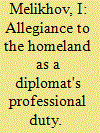

|
|
|
|
|
| Publication |
2010.
|
| Summary/Abstract |
Homeland and adherence to professional duty. They had to perform such urgent, top priority tasks as mobilizing the international capabilities of the Soviet Union to rebuff the Fascist aggression, prevent enlargement of the Fascist coalition, and take advantage of the contradictions in the enemy camp to effect its split. In order to perform these momentous tasks, Soviet diplomats were required to have the following capabilities: in-depth knowledge of all the intricacies of international problems as a whole and of those in their immediate work field in particular; high resistance to stress; the ability to work efficiently under psychological pressure and in conditions of high physical exertion; the competence to rapidly make decisions and carry them out in perpetual extraordinary situations; and the ability to subtly bring partners round to their way of thinking during talks and negotiations.
|
|
|
|
|
|
|
|
|
|
|
|
|
|
|
|
| 4 |
ID:
100175


|
|
|
|
|
| Publication |
2010.
|
| Summary/Abstract |
THE GENERAL ELECTION in Britain was drawing a close media attention since it was out of the ordinary. Indeed, news was coming in thick and fast. At the same time, expectations that the leader of the Conservative Party, David Cameron, would enter Number 10 the next day the votes were counted, on Friday, May 7 proved wrong. Which of the events were expected and which were fortuitous? As always, the devil is in the details, which we are going to go into to dig up background information.
You will recall that Gordon Brown took over as leader of the Labour Party in late June 2007. The impression was, after Tony Blair's resignation, that, lacking the charisma of his predecessor, but winning a solid reputation during ten years in the position of Chancellor of the Exchequer, Gordon Brown would be able to help Labour to find their second wind.
|
|
|
|
|
|
|
|
|
|
|
|
|
|
|
|
| 5 |
ID:
100191
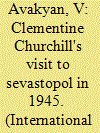

|
|
|
|
|
| Publication |
2010.
|
| Summary/Abstract |
THE STATE ARCHIVES of the city of Sevastopol contains documentary photographs pertaining to the city's history. Last year we found, among the negatives belonging to press photographer M.B. Pokatilo, pictures showing Clementine Churchill, the wife of the British prime minister.
The pictures document her visit to Sevastopol on April 24, 1945. Whereas photographs of the Allied leaders Churchill, Roosevelt, and Stalin at the Yalta Conference have long been well familiar to scholars and the general public, researchers gave her visit to Crimea just a cursory treatment and there, until recently, were no pictures found having to do with the visit.
|
|
|
|
|
|
|
|
|
|
|
|
|
|
|
|
| 6 |
ID:
100179


|
|
|
|
|
| Publication |
2010.
|
| Summary/Abstract |
BADLY SCARRED by World War I, Western Europe will always feel less anguish over World War II than Russia and the Russians over the Great Patriotic War.
Only two states - the Soviet Union and the German Reich - paid all the bills of World War II which caused disastrous destruction at the Eastern Front and strained human potential to the utmost. For various reasons, Europe offered disjointed resistance to the fascist onslaught: none of the states of continental Europe could, or was willing, to measure swords with Berlin.
|
|
|
|
|
|
|
|
|
|
|
|
|
|
|
|
| 7 |
ID:
100176
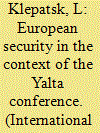

|
|
|
|
|
| Publication |
2010.
|
| Summary/Abstract |
IN OUR POLITICAL SCIENCE and scholarly literature, the decisions made at the Yalta and Potsdam conferences are more and more often viewed retrospectively. In this context, the opinion about the demise of the Yalta-Potsdam system of international relations is gaining ground. This approach has become especially fashionable since the breakup of the Soviet Union, one of the participants in the anti-Hitler coalition. Is this judgment, this position with regard to the decisions of the said conferences justified, and have they really lost their relevance and importance?
|
|
|
|
|
|
|
|
|
|
|
|
|
|
|
|
| 8 |
ID:
100188


|
|
|
|
|
| Publication |
2010.
|
| Summary/Abstract |
THE DOCUMENTS from the RF Foreign Ministry Historical Documents Department made public for the first time relate to one of the little-known pages of the Great Patriotic War. According to the documents, the 70th Army of the 2nd Byelorussian Front under Marshal Konstantin Rokossovsky seized the town of Prenzlau on April 27, 1945 during the course of the Berlin operation. Later in the day the army freed the inmates of the concentration camp, a short way from the town. Among the POWs were 2,311 officers of the Belgian army, including 33 generals.
|
|
|
|
|
|
|
|
|
|
|
|
|
|
|
|
| 9 |
ID:
100178


|
|
|
|
|
| Publication |
2010.
|
| Summary/Abstract |
THERE ARE MANY PHENOMENA in international life which repeatedly revive in international relations to give food for thought about their roots and origins. Today, nationalism, the curse of the 20th century to which many politicians and historians hoped to refer in past tense, has moved to the fore despite deepening globalization. Nationalism proved to be too viable to die a quiet death. Today, as in the past, it owes much of its fairly conspicuous presence on the world scene to history.
Nationalism as an independent political force was born by the 1789 French Revolution which declared that sovereignty of any country belonged to the nation as a community of citizens. Back in the mid-18th century, Cardinal Richelieu tried to plant the national idea in the minds of the rulers of France to strengthen it in the face of the hostile Spanish and German Habsburgs. He complained that the French "have little love for their country" and that "the light-mindedness of our people renders them
|
|
|
|
|
|
|
|
|
|
|
|
|
|
|
|
| 10 |
ID:
100180


|
|
|
|
|
| Publication |
2010.
|
| Summary/Abstract |
DOCUMENTS from the Archive of Foreign Policy of the Russian Federation that are being published relate to the early period of the Korean War which was the first large-scale military conflict of the Cold War era. During the discussion of the Korean issue, the United States and its allies managed to secure a decision they needed from the UN Security Council and take direct part in the war under the flag of international peacekeeping forces. The U.S. supposed that the Soviet Union would also take direct part in the military conflict in Korea. All this contributed to a dramatic worsening of relations between the two countries. The USSR leadership however did not plan to involve directly its forces in the military operations.
|
|
|
|
|
|
|
|
|
|
|
|
|
|
|
|
| 11 |
ID:
100189


|
|
|
|
|
| Publication |
2010.
|
| Summary/Abstract |
ON THE NIGHT of June 22, 1941, Prime Minister of Sweden Per Albin Hansson stayed at his apartment in Olsten near Stockholm from celebrations of the Midsummer Festival, one of the most popular outdoor holidays in Sweden, preferring to have a party at home. "He knew that war may break out any moment and he did not want to leave Stockholm. He had asked [...] the foreign minister and close friends over to have a bite to eat, a couple of drinks and play cards. The party went on until the small hours. Hardly had Per Hansson gone to bed, the telephone rang and he was told that Germany invaded Russia. So the premier took the tram and went downtown."1
He learned on arrival that the Germans had demanded, among other things, the use of Swedish railroads to transfer to Finland their 163rd Infantry Division commanded by General Erwin Engelbrecht. The head of Sweden's Foreign Ministry hastened, behind the premier's back, to report the German demands to King Gustaf V Adolf who summoned the head of government to appear at his Stockholm residence and threatened to abdicate unless the government met these demands.
|
|
|
|
|
|
|
|
|
|
|
|
|
|
|
|
| 12 |
ID:
100171
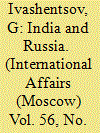

|
|
|
|
|
| Publication |
2010.
|
| Summary/Abstract |
RUSSIA AND INDIA are in the top league of today's world politics; it is impossible without their participation to resolve either the most pressing regional or most important international problems. This was extremely clearly confirmed by the recent working visit by Russian Prime Minister Vladimir Putin to India. This visit drew a wide attention not only in both countries but a considerable response the world over.
|
|
|
|
|
|
|
|
|
|
|
|
|
|
|
|
| 13 |
ID:
100187
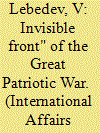

|
|
|
|
|
| Publication |
2010.
|
| Summary/Abstract |
HE TRAGIC DAY for the entire Soviet people - June 22, 1941 - radically changed the operation of all foreign intelligence. The Edict of the Presidium of the USSR Supreme Soviet of July 20 merged the People's Commissariat for Interior Affairs (NKVD) and People Commissariat for National Security (NKGB) to form a single entity - the NKVD in order to concentrate the resources of state security agencies during wartime. The Fifth (Foreign) Directorate of the Main Directorate of State Security (GUGB) was reorganized into the First Directorate of the NKVD. Shortly before the war it had a staff of 700, ran 40 intelligence stations abroad with some 240 intelligence officers. The latter were connected to over 600 agents.
|
|
|
|
|
|
|
|
|
|
|
|
|
|
|
|
| 14 |
ID:
100194


|
|
|
|
|
| Publication |
2010.
|
| Summary/Abstract |
THE MARKET REFORMS of the 1990s temporarily pushed to the side everything what was going on beyond the Russian borders. Recently, however, the global economic crisis, NATO's eastward expansion up to the Russian borders; American plans of deploying ABM elements in Poland and the Czech Republic and many other international developments put the outside world back into the focus of Russia's attention. The political community and the public should wake up to the consequences of the tectonic shifts on the international scene.
|
|
|
|
|
|
|
|
|
|
|
|
|
|
|
|
| 15 |
ID:
100170


|
|
|
| 16 |
ID:
100174
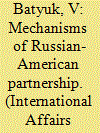

|
|
|
|
|
| Publication |
2010.
|
| Summary/Abstract |
A MONOPOLY on organized armed violence present in all civilized states is absent from international relations as a special sphere of human activity: in an absence of the so-called global governance the subjects of international relations are guided by their own interests (as they interpret them).
This does not mean, however, that the world is an arena of "struggle of all against all": several millennia of international relations taught people to maintain peace and sustainable world order without global governance. The international regimes and organizations within these regimes can be described as one of the most efficient instruments of international cooperation. Any regime can be described as a sum-total of international legal norms yet an international regime is present only where and when its norms and rules do regulate the conduct of the subjects of international relations.
|
|
|
|
|
|
|
|
|
|
|
|
|
|
|
|
| 17 |
ID:
100166
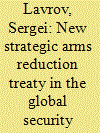

|
|
|
|
|
| Publication |
2010.
|
| Summary/Abstract |
A COMPREHENSIVE AND OBJECTIVE ANALYSIS of the political significance of the new Russian-U.S. strategic arms reduction treaty ought to be based on the understanding that this agreement means much more to the Russian Federation than just another disarmament project. We worked consistently to align the treaty with Russia's conceptual approaches toward international security cooperation. It is in the context of these approaches that the document, signed on April 8 of this year in Prague, should be considered. In this connection it would be logical to start off with an overview of the foreign policy philosophy underlying the Russian efforts in the security sphere, including the New START Treaty.
|
|
|
|
|
|
|
|
|
|
|
|
|
|
|
|
| 18 |
ID:
100182


|
|
|
|
|
| Publication |
2010.
|
| Summary/Abstract |
ONE OF THE THORNIEST ISSUES in today's international situation is the creation in North Korea, or the Democratic People's Republic of Korea (DPRK), of nuclear weapons. The world community believes it undermines international stability and security and urges that the DPRK scrap its nuclear program. As for Pyongyang, it insists on its sovereign right to have this deterrent. The farther the North goes along this road, the stronger is the pressure upon it and the worse the situation surrounding this state. As a result, there is a danger that the process may not only spin out of control but also spark a serious conflict on the Korean Peninsula.
|
|
|
|
|
|
|
|
|
|
|
|
|
|
|
|
| 19 |
ID:
100192


|
|
|
|
|
| Publication |
2010.
|
| Summary/Abstract |
I BECAME ACQUAINTED with Andrei Gromyko in January 1975 after the Carnation Revolution when I paid an official visit to the Soviet Union as Minister of Foreign Affairs of Portugal. Gromyko occupied an analogous post and, which was much more important, was a member of the CPSU Politburo.
He was a very reserved person and did not talk much. Nevertheless, we had a very serious and quite open conversation at a very difficult time for our countries. His wife, whom I also met at that time, helped to set the right mood. She was extremely well-versed in Russian literature, and we talked about Leo Tolstoy, Fyodor Dostoevsky, Maxim Gorky, Alexander Pushkin, Anton Chekhov, Boris Pasternak, and even Alexander Solzhenitsyn...
|
|
|
|
|
|
|
|
|
|
|
|
|
|
|
|
| 20 |
ID:
100183


|
|
|
|
|
| Publication |
2010.
|
| Summary/Abstract |
Unclassified reports the U.S. National Intelligence Council issued every four years to cover possible developments of the next decade and a half stand apart from what is published in this field all over the world. The latest of such contributions - Global Trends 2025: A Transformed World (hereinafter Report) - was published in November 2008; its draft had been completed by May 2008, before the military conflict in the Southern Caucasus which altered not so much the balance of forces in the region as the ideas of the rivaling subjects of international relations about one another. This applies, to an even greater extent, to the global crisis which spread to all spheres of economic activities in the fall of 2008 and the winter of 2009. We have to admit that the world academic community (with the exception of marginal alter-globalist and neo-Marxist trends always ready with apocalyptical forecasts of global calamities) was taken by surprise. Today, it is busy, in hindsight, looking for a rational explanation of what has happened and for possible disentanglements. In this context the authors had to move to risky forecasts of demographic and climate change, Iran's nuclear file and the state of the world financial markets. The Introduction pointed out that the individual still played an important role in history and that it is true for the totalitarian (Lenin, Stalin, Hitler, Mao Zedong) and for democratic (Churchill, Roosevelt, Truman) societies. The authors warn against the dangers of economic instability: fast economic changes (negative and positive alike) undermine the democratic institutions; they insist on the key role of technological progress in the current changes. They wrote that the numerous wars,
|
|
|
|
|
|
|
|
|
|
|
|
|
|
|
|
|
|
|
|
|